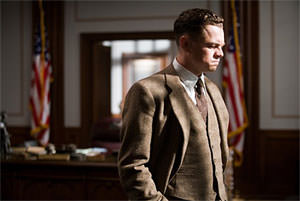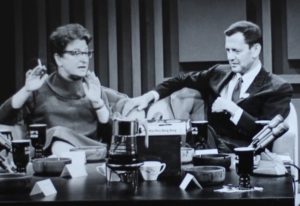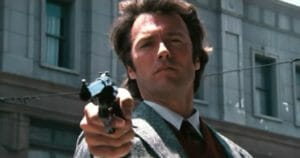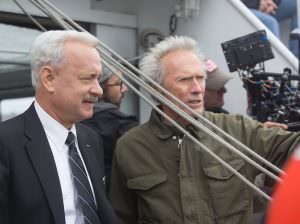‘J. Edgar’: Hoover’s Hubris Writ Large
This is a brave film. There was a time when J. Edgar Hoover was among the most prominent Americans and there was no way to make a reasonably honest movie about him. Now there is a tendency to ask, J. Edgar Who?Even by Clint Eastwood's austere standards, "J. Edgar" is a very plain movie. And all the more powerful being so.
Even by Clint Eastwood’s austere standards, “J. Edgar” is a very plain movie. And all the more powerful being so. It simply tells the story of J. Edgar Hoover, head of the Federal Bureau of Investigation — or America’s “top cop” as the headlines of his day styled him — from the time he took charge of a predecessor organization in 1924 until his death in 1972.
In that period he was a revered figure. Or maybe just a feared figure. Whether he was chasing down gangsters in the Midwest or trying to find the Lindbergh baby’s kidnapper or, perhaps most important to him, keeping tabs on “subversives,” he was a master of public relations. With his bulldog countenance and his take-no-prisoners attitude, Hoover personified modern law enforcement and, to give the devil his due, he transformed the FBI into the model of a scientifically based law enforcement agency.
The true secret of his success, however, was his files. No one, except Hoover and perhaps his assistant, Helen Gandy (beautifully portrayed by Naomi Watts as his ever-patient helpmate), knew what they contained. And no one wanted to find out. A succession of presidents was tempted to challenge him, but, in the end, none of them did. After his death, Gandy destroyed the files. A few surviving scraps of paper are the only evidence that they existed at all.
Hoover grew weirder and weirder as the years wore on. It is tempting to see him as the ultimate bureaucrat, fiercely defensive of his institution and his position within it, vicious with any challenges to his power (there weren’t many). He is played by Leonardo DiCaprio in a performance that is nothing short of towering, though in a very quiet way. This is far more than a matter of expert age makeup. He speaks quietly, insinuatingly, reasonably. Under Hoover’s leadership, the FBI rolled out movies, radio programs, comic books, anything that helped keep his organization at the forefront of public consciousness for decades. His “special agents,” always polite and clad in dark suits and ties, were a somewhat refreshing contrast to the more bumptious representatives of law and order at the height of his reign.
There were, of course, oddities about him, notably his sexuality. He lived in an era when “perpetual bachelorhood” was not an automatic signal of covert homosexuality. It was put about that The Director, preoccupied with the fight against crime, simply didn’t have the time and energy for sexual hanky-panky. He was frequently seen dancing with Ginger Rogers’ mother, and, sometime after his death, actress Dorothy Lamour claimed to have had a brief affair with him (not mentioned in the movie). That was enough to keep the gossips at bay. These were, after all, simpler times. The idea that a highly placed public figure might be gay was simply not thought about.
Which rather leaves out of the picture one Clyde Tolson. He was a Mormon, an FBI agent and he is beautifully played in the film by Armie Hammer as an obliging, good-natured fellow — lovable in ways that Hoover never was. He lived with Hoover, took virtually every meal with him and every vacation too. Were they just “pals”? Or was there something more intimate in their friendship? The movie implies a sexual relationship. But again, there was something in the spirit of the times that protected them. Male “bonding,” as we’ve since learned to call it, was considered a rare, but not unknown, alternative lifestyle. (So was female bonding, and Hoover had the evidence on Eleanor Roosevelt’s lesbianism to prove it.) This was especially true in the case of Hoover and Tolson. There was nothing furtive in their pairing, rather the opposite, as the movie would have it. One would not call it redemptive, but it does render Hoover almost likable — even pathetic — on occasion.
This is a brave film. There was a time when J. Edgar Hoover was among the most prominent Americans and there was no way to make a reasonably honest movie about him. Now there is a tendency to ask, J. Edgar Who? And to wonder how so much secretive power came to reside in one man of rather limited, if dogged (and creepy) skills. And it is somewhat odd that Eastwood, not a man known for publicly espousing his political interests, has chosen to make this film at this time. And to make of it such a devastating portrayal of a rather ordinary man caught in the grips of paranoia and hubris.
Does he intend it as a warning shot, a reminder that men like Hoover are an ever-present danger to democracy, which is always looking for simplified images of muscular virtue to celebrate? It would be hard to think anything else — especially since Dustin Lance Black’s script is a model for enterprises of this kind, tracing Hoover’s rise from momma’s boy (Mom is perfectly played by Judi Dench) to a posturing machismo figure, without ever raising its voice. The hollowness of the man is suggested merely by the odd lilt in DiCaprio’s voice at certain tense or uncertain moments. Most of the time he is just calmly going about his business — which is the subversion of republic, about whose best values he has not a clue.
The danger, of course, is that Hoover is too distant a figure, too much a man of another time and place for today’s audience to forge an appalled relationship with. Eastwood, obviously, has bet the other way. With this handsomely crafted, impeccably acted movie, he is saying that it can happen here — again and again. In making this point, distance (Hoover died almost 40 years ago) lends an eerie enchantment to this tale. It helps us to objectify the man, to see that he is far from being a rare bird in our political life — just a very busy and a very dangerous one. I don’t think there has ever been a calmer, and therefore more potent portrait, of the demagogue as a tense yet serene bureaucrat.
Your support matters…Independent journalism is under threat and overshadowed by heavily funded mainstream media.
You can help level the playing field. Become a member.
Your tax-deductible contribution keeps us digging beneath the headlines to give you thought-provoking, investigative reporting and analysis that unearths what's really happening- without compromise.
Give today to support our courageous, independent journalists.





You need to be a supporter to comment.
There are currently no responses to this article.
Be the first to respond.